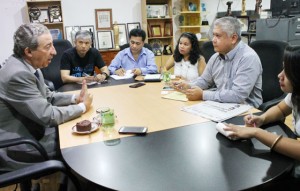The European Union (EU) has expressed concern about terrorism that threatens economic success and stability, not only in Europe but all over the world, Spain’s ambassador to the Philippines said on Tuesday.
During a roundtable interview with The Manila Times editors and staffers, Spanish Ambassador Luis Calvo said EU-member countries are committed to jointly fight radicalization and recruitment by terrorists.
“We are very much concerned [about] this radicalization [and jointly fighting it] is how we take action against [it],” Calvo added.
According to the ambassador, in Spain alone the “radical version of Islam” is now an issue.
“That’s very much in the headlines of Spanish newspapers everyday. That is an issue because it’s very dangerous,” he said.
In an effort to fight terrorism, Calvo added, EU member-states, including Spain, are working with the United Nations.
“I think we have a strategic problem with radical groups [waging] jihad [holy war]. We unite with the UN to fight this phenomenon,” he said
“We in the European Union are committed to dismantling all the cells that have been created by the radical groups in the region,” Calvo added.
Between 2009 and 2013, according to a European Council report, there were 1,010 failed, foiled or completed attacks carried out in EU member-states, in which 38 people died.
In addition, the report said, several European citizens have been kidnapped or killed by terrorist groups around the world.
“The phenomenon of fighters from Europe traveling to different locations to [join] the jihad and the security threats they may pose inside the EU when they return are also likely to persist in the coming years,” it added.
“Since these threats do not recognize borders, they must be confronted at both [the] national and international level[s],” the report said.
‘Not a religious conflict’
For the Spanish ambassador, radicalization is a “cultural, political and economic problem.”
“They’re saying religion has something to do with it. I think religion is being politically used to promote and advance radicalization,” Calvo said.
The Spanish envoy pointed to Europe’s openness to various religions.
Radical groups “feel this [openness] is a show of weakness and they think we are a weak society, a weak civilization, because we are flexible to allow Muslims to practice their religion in our land,” Calvo said.
“This is not a weakness, this is a strength of open societies and democratic systems,” he added.
Calvo asked, “Would you consider opening a mosque in the middle of Manila or Zamboanga a sign of weakness of a society?”


